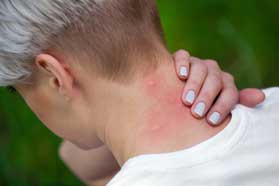Insect Sting Allergy Treatment in Valley Village, CA

What Causes Allergic Reactions to Insect Bites?
Each year, millions of children and adults find themselves the unwanted targets of stinging insects such as fire ants, wasps, yellow jackets, hornets, and honeybees. For most, the venom these insects release into your body through bites and stings will cause a local reaction, such as redness, pain, and inflammation, but cause no serious harm.
For others, a more severe reaction can occur when the immune system overreacts to the stinging insect venom. This reaction, known as an insect sting allergy, produces more severe symptoms and can cause a life-threatening reaction called an anaphylactic shock , requiring immediate medical attention.
If you suspect you or a loved one have an allergy to stinging insect venom, it is important to seek medical care. Schedule a consultation with a healthcare practitioner in Valley Village who specializes insect sting allergy treatment, call (424) 365-1800 or contact Dr. Jeremy Fischer online.
Insect Allergy Symptoms
Insect bite allergy symptoms can range from mild to severe. Typically, they develop rapidly after the insect bite or sting and occur as the body produces antibodies in an attempt to fight off the allergen.
Both people with and without insect bite allergies are likely to experience discomfort in the bite area, including:
- Burning pain
- Redness
- Swelling
- Itching
However, those with an insect sting allergy are likely to experience additional irritation. The most common symptoms of insect bite allergy include:
- Hives
- Swelling in areas not impacted by a sting
- Abdominal cramping
- Nausea or vomiting
- Difficulty swallowing
Severe (anaphylactic) reactions include:
- Difficulty breathing
- Intense swelling in face or throat
- Anxiety
- Dizziness
- Rapid pulse
- Sharp drop in blood pressure
- Unconsciousness or cardiac arrest
Insect Allergy Testing
If you believe you are experiencing an allergic reaction to an insect bite or sting, it is important to meet with your healthcare practitioner. Your healthcare provider will review your medical history, paying particular attention to past and present allergies, and evaluate your symptoms.
The three common allergy tests that can detect the presence of an insect allergy are skin-prick, blood, and intradermal skin tests. These test will not determine the strength of your allergic reaction, but rather whether or not an allergy is present.
In a skin-prick test , a very small amount of the insect venom is placed on the forearm and then pricked into the skin with a small, sterile probe. If you have an allergy, you will see raised, red colored spots appear on your forearm within 15 to 20 minutes.
In a blood test, a sample of blood will be tested for immunoglobulin E (IgE) antibodies to insect venom. The intradermal skin test is considered to be more accurate at detecting IgE antibodies and is usually performed if the skin-prick or blood tests are inconsistent with your past allergy history. In an intradermal skin test, a small amount of venom extract will be injected under your skin. The site will be examined for 15 to 20 minutes for signs of an allergic reaction.
Insect Bite Allergy Treatment
Treatment for a stinging insect allergy is dependent on the severity of your symptoms. Both a non-allergic reaction and mild allergic reaction to an insect bite can be treated with the following steps:
- Remove any jewelry around the sting or bite area
- Remove any stingers stuck in your skin with tweezers
- Wash the area with soap and water
- Apply an antiseptic, a soothing ointment, and then cover with a dry, sterile bandage.
- Apply ice to the area to reduce swelling
- Take over-the-counter medication, such as oral antihistamine to treat itching, swelling and hives, and ibuprofen to relieve pain (You should not give antihistamine to children under 2 years of age, or pregnant woman)
For more serious insect bite allergies, your healthcare provider will likely prescribe epinephrine (adrenaline); this is a self-injectable device that should be carried with you, especially if you plan on spending time outdoors. Any occasion in which you use epinephrine, even if the reaction was adequately controlled, should initiate a follow-up with your healthcare provider. An allergic reaction can continue to progress when the epinephrine has worn off.
In the case of anaphylactic shock, call emergency personnel immediately. Drugs administered during emergency treatment other than epinephrine can include antihistamines and sometimes corticosteroids. You may stay in the hospital overnight for observation.
Allergic Reaction Prevention
Regardless of whether or not you have an allergy to insect bites, various methods to prevent harmful contact with insects include:
- Avoid swatting at insects
- Using insect repellents outside
- Traveling outside with a partner
- Learning how to recognize and avoid insect nests
- Using screens on doors and windows at home
- Covering outside garbage cans, food, and drinks with tight-fitting lids
- Wearing long sleeved shirts, pants, socks, and shoes outside
- Avoid sweet-smelling perfumes, colognes, and deodorants
- Avoid wearing bright clothing
- Wearing identification to alert others that you have an insect allergy
An insect allergy is a very serious condition. To find a healthcare practitioner who can provide effective insect bite allergy treatment in Valley Village, call (424) 365-1800 or contact Dr. Jeremy Fischer online.
Vitality Integrative Medicine
Address
4849 Van Nuys BlvdSuite 104
Sherman Oaks, CA 91403
(424) 365-1800
www.vitalityintegrative.com
Hours
Mon:
8:00 am - 6:00 pm
Tue:
8:00 am - 6:00 pm
Wed:
8:00 am - 6:00 pm
Thu:
8:00 am - 6:00 pm
Fri:
8:00 am - 6:00 pm
Sat:
8:00 am - 12:00 pm

